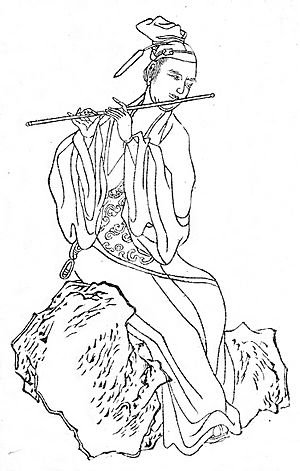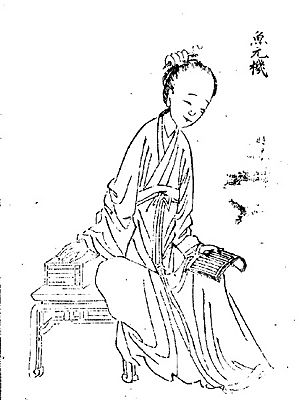Wen Tingyun facts for kids
Quick facts for kids Wen Tingyun |
|||||||||||||||||
|---|---|---|---|---|---|---|---|---|---|---|---|---|---|---|---|---|---|
 |
|||||||||||||||||
| Traditional Chinese | 溫庭筠 | ||||||||||||||||
| Simplified Chinese | 温庭筠 | ||||||||||||||||
|
|||||||||||||||||
Wen Tingyun (simplified Chinese: 温庭筠; traditional Chinese: 溫庭筠; 812–870) was a famous Chinese poet. His birth name was Wen Qi (simplified Chinese: 温歧; traditional Chinese: 溫歧; pinyin: Wēn Qí). He was also known by his courtesy name Feiqing (simplified Chinese: 飞卿; traditional Chinese: 飛卿; pinyin: Fēiqīng). He was an important writer of lyrics during the late Tang Dynasty in China.
Wen Tingyun was born in Qi, Shanxi province. He is known as the first truly special writer of ci poems. Ci is a style of poetry that uses song-like verses. This style was very popular in Chinese poetry during the late Tang and Song dynasties. Many of his poems describe beautiful homes and gardens. They often show the hidden feelings of women living alone. This type of poetry was often used for romantic messages in the capital city of Chang'an.
Wen Tingyun is also seen as the founder of the "Hua Jian" (Flowery) school of Ci poetry. This style focuses on specific patterns and rhythms. About 300 of his poems have been saved. More than 70 of his Ci poems are in books like Hua Jian Ji and Jin Quan Ci.
His son, Wen Xian (温憲), also became a poet.
Contents
Early Life and Education
Wen Tingyun's exact birth date is not known from historical records. However, people have estimated it to be around 812 A.D. Some scholars think he might have been born earlier, around 798 A.D.
Wen Tingyun was born in Taiyuan. He came from a family with a history of important people. His ancestor, Wen Yanbo, was a prime minister in the early Tang Dynasty. From a young age, Wen Tingyun loved literature. Sadly, his father died early, and his family became poor. A friend of his father's then helped him. This friend paid for Wen to study alongside his own son, Duan Chengshi.
Career Challenges
At the start of his career, Wen Tingyun was well-liked by important people. The prime minister, Linghu Tao, was kind to him at first. The emperor, Li Chen, really loved a song called "Pu Sa Man." Linghu Tao then gave the emperor twenty of Wen Tingyun's "Pu Sa Man" lyrics. He lied and said he wrote them himself. Linghu Tao asked Wen to keep it a secret.
However, Wen Tingyun soon told everyone the story. Another time, Wen told Linghu Tao in front of other officials that a prime minister should read more books. This made Linghu Tao very angry. After these events, Linghu Tao secretly worked against Wen Tingyun. He even bribed the people who graded the imperial examinations. This made it hard for Wen Tingyun to get a good job.
Wen Tingyun tried to pass the imperial examination many times. He failed repeatedly because of Linghu Tao's actions. When he realized what was happening, he felt very disappointed. He lost his desire to become an official through the exams. Wen Tingyun still took the imperial exams. But his goal changed. He started helping others to protest the unfair system.
Later Success and Reforms
Later, Li Cui became the new emperor. Yang Shou became the new prime minister. In 866, Wen Tingyun was recommended for a job. He became an instructor at the State Sons' University. Wen Tingyun wanted to make the imperial examination system fair. He did not want others to be treated unfairly like he was.
He made changes so that students could see their scores. They could also check the essays of the top student. This made the exams more open and honest. But these changes upset powerful people. The new prime minister, Yang Shou, then removed him from his position. Wen Tingyun died soon after, in 866 A.D.
Poetry Style and Themes
Wen Tingyun also had a talent for music. Because of this, his poems often have a strong rhythm. His poems cover many topics and show deep thoughts. He used many different artistic ways to express himself in his poems.
Many of his poems focused on showing feelings. They also described the world around him. The people in his ci poems are mostly women. The main idea is to show their feelings of sadness and longing.
Geng Louzi
"Geng Louzi" is one of Wen Tingyun's ci poems. Here is a translation by Paul F. Rouzer:
“Geng Louzi Incense in the jade burner玉爐香, Tears on the red candle紅蠟淚, They stubbornly shine on autumn grief in painted halls偏照畫堂秋思。 Emerald mascara light眉翠薄, Side-curl clouds thin,鬢雲殘, The night is long, coverlet and pillow cold夜長衾枕寒。 Wutong trees梧桐樹, And midnight rain 三更雨 Don't know the grief felt right now at parting不道離情正苦。 Leaf by leaf一葉葉, Sound by sound一聲聲, They drop on empty stairs till day空階滴到明。” (Rouzer 1993)
"Geng Louzi" can also be called "on the water clock at night." In this poem, everything in the setting seems to share the character's feelings. The character also feels that the environment makes her sadness worse. The writer blends emotions and scenes. This helps to show the strong feelings of the characters.
Buddha-like barbarian
Here is a translation of "Buddha-like barbarian" by Zhong-qi Cai:
“Buddha-like barbarian Layer on layer of little hills, golds shimmer and fade, 小山重叠金明灭 Cloud locks hover over the fragrant snow of a cheek. 鬓云欲度香腮雪 Lazily rising to paint on mouth eyebrows, 懒起画蛾眉 Dallying with makeup and hair. 弄妆梳洗迟 yeyanqu Blossoms are mirrored behind and before, 照花前后镜 Flowers faces reflect one another. 花面交相映 Newly embroidered on a jacked of silk 新帖绣罗襦 Are pair after pair of golden partridges.” (Cai 2008) 双双金鹧鸪
"Buddha-like barbarian" (Pu Sa Man) uses more detailed pictures than "Geng Louzi." The first two lines likely describe a screen in a lady's house. The "pairs of partridges" and the word "lazily" suggest a woman's happiness in her relationship. The poem does not use many words to describe the woman's feelings. But the feeling of longing is hidden within the lines.
A Night Banquet
Sometimes, Wen's poems about women also showed his unhappiness with powerful people. Paul F. Rouzer translated A Night Banquet as follows:
“A Night Banquet The long hairpins, a pair of dragonflies 长钗坠发双蜻蜓 In her dangling locks. Where the green fields end and hills slant, 碧尽山斜开画屏 painted screens open. The curly-whiskered duke’s son 虬须公子五侯客 and guests of the five marquis. In one round down a thousand cups 一饮千钟如建瓴 like rain from the roof tiles. Phoenix-throated, the beauties sing— 鸾咽奼唱圆无节 seamlessly, with perfection. Brows contract—Xiang river mist— 眉敛湘烟袖回雪 sleeves are whirling snow. “In this clear night, kind feelings 清夜恩情四座同 are shared by one and all; So don’t let the canal waters 莫令沟水东西别 part, east and west.” Set upright, the candles weep, 亭亭蜡泪香珠残 their scented beads wane. Dark dew and morning wind 暗露晓风罗幕寒 gauze curtains chill. Imposing halberd banners 飘飖戟带俨相次 flutter in ranks. Their twenty-four poles 二十四枝龙画竿 are dragon bedecked. Shrill pipes, flurried strings— 裂管萦弦共繁曲 a piece in symphony. Tiny ripples in scented goblets— 芳樽细浪倾春醁 darkness toss off the spring brew.' In the high rooms, guests disperse 高楼客散杏花多 mid so many apricot blossoms. With yearning, the new frog-moon 脉脉新蟾如瞪目 stares down with amorous eyes.” (Rouzer 1993)
Achievements and Influence
Wen Tingyun wrote many poems. He is known as the founder of the Flowery school of Ci poetry. He was the first to write a large number of Ci poems. This was very important for the popularity of Ci poetry in the Song dynasty.
The Flowery School
Wen Tingyun did not plan to create the Flowery School. But later generations recognized him as its founder. The Flowery School of Ci poetry was connected to the political situation at the time. After the An Lushan Rebellion, the Tang Dynasty's government and society were in decline.
Wen Tingyun's works inspired many people. More and more poets began to write in a delicate style. This style focused on showing emotions. It also openly talked about love between men and women. These works were collected in a book called Hua Jian Ji. Because of this book, later generations called this style of ci the Flowery (Hua Jian) school.
Interesting Stories
Wen Bacha
After Wen Tingyun realized Linghu Tao was working against him, he took the imperial exam differently. He used it to help others. People gave him the nickname "Wen Bacha," which means "Wen Eight-cross." This was because he could finish writing an essay after crossing his hand eight times. Even when he was made to take the exam alone behind a curtain, he still secretly helped eight people during one exam.
Changing His Name
Wen Tingyun used to have another name, Wen Qi. This might be related to an event called the Jiang Huai incident. He might not have been able to use that name for the exams anymore. Some people think his name was Wen Qi from birth. They believe he changed it to Wen Tingyun to take the imperial exams. However, some researchers, like Mou, believe his name was Wen Tingyun first. Then he changed it to Wen Qi, and finally changed it back to Wen Tingyun.
Yu Xuanji
Yu Xuanji was a female Chinese poet. Her original name was Yu Youwei. She was a young maid doing laundry. Wen Tingyun found her, helped her, and became her teacher.
See also
 In Spanish: Wen Tingyun para niños
In Spanish: Wen Tingyun para niños


